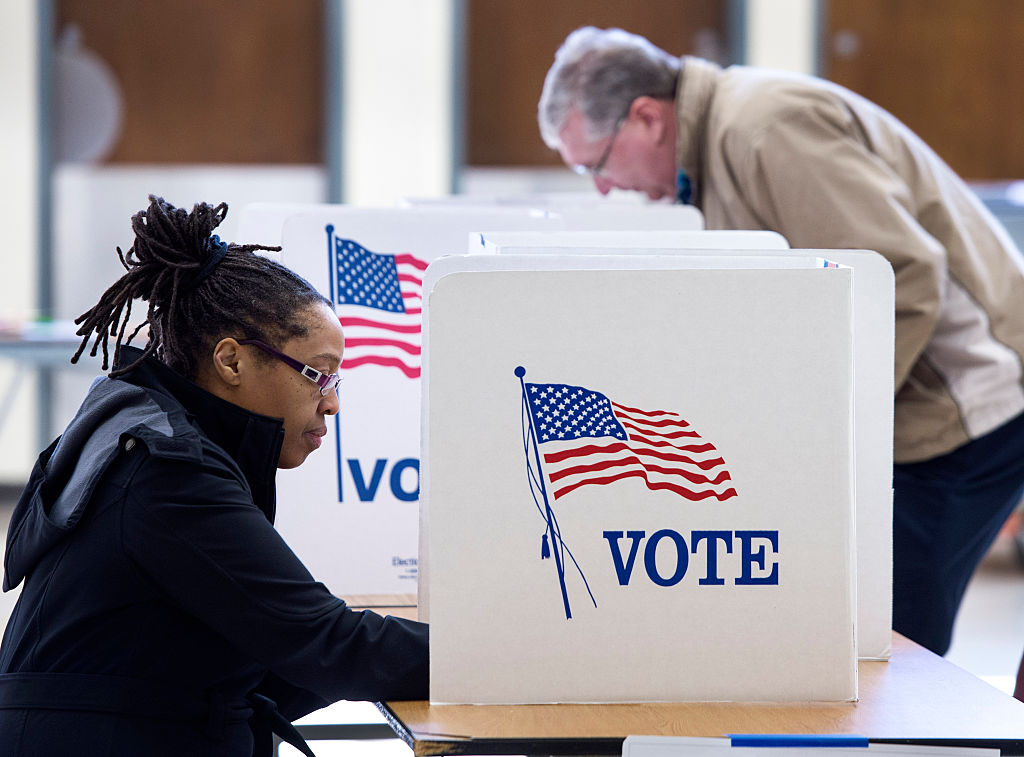The turnout tables have turned
“When we vote, we win.” So goes a favorite Democratic Party aphorism. I heard it from Amy Klobuchar campaigning for Terry McAuliffe in Northern Virginia last month. And I’ve heard it from countless others, in races across the country, as they urge audiences to register to vote, tell their friends to register to vote and get out there ahead of an election.
Behind this slogan is the assumption that high turnout helps Democrats. But Tuesday’s election is the latest evidence that this dynamic is changing, and may have even reversed.
In Virginia, turnout was up 26 percent on the last gubernatorial contest and the Republican won. The ten counties with the biggest increase in vote totals were all won by Glenn Youngkin. Turnout was also up in New Jersey, and the pattern was the same, with the GOP candidate winning in eight of the ten counties with the largest jumps in voter numbers.
The great realignment transforming US politics, with Republicans taking on more and more working-class, non-college-educated voters and Democrats increasingly becoming the party of upper-middle-class professionals, has changed the country’s turnout dynamic. But it is yet to blast through the way in which both parties think about the issue.
Republicans have a hard-wired suspicion of high turnout, just as Democrats cling to the outdated “if we vote we win” truism. These twin convictions are increasingly at odds with the parties’ material interests. But on both sides of the aisle, turnout is more than just a dry question of psephology.
The cynical notion that the GOP benefits from voters staying at home is at least loosely related to the Trumpian right’s obsession with voter fraud. When Trump told voters in Georgia that fraud means the ballot box cannot be trusted, turnout fell and Republicans lost.
On the other side of the aisle, the commitment to making it as easy to vote as possible belies a deep-seated conviction that only unfair rules stand between America and a never-ending Democratic reign.
A reversal in the turnout dynamics cuts to the core of the both parties’ psyches. It blasts through the over-simplified stories the two parties tell themselves. And that is why it is such a positive development.
Above all else, the changing rules of who gains from high turnout lowers the stakes in the over-heated and misguided democracy wars. Contrary to claims about “voter suppression,” the rules over how Americans vote — whether or not you can do it without leaving your car at two in the morning a month before Election Day, for example — don’t appear to affect turnout all that much. And, crucially, nor do they favor one party or the other.
A cooly self-interested Republican Party might be tempted to take a gamble on these questions: embrace Democrats’ proposals that would make it easier to vote, neuter the charge that they are enemies of democracy, assume that the realignment leaves them with more to gain than their opponents and beat them at their own game by registering droves of white, non-college educated voters in swing states among whom turnout remains relatively low.
More likely, they’ll stick to their long-standing habit of treating high turnout with suspicion. Either way, the turnout trend is a welcome rebuttal to the doomsayers about American democracy on both sides of the aisle.
The power of fun
On Wednesday, we reported on Eric Adams’s election night rager. A few hours later on breakfast TV, he was questioned about his partying. Asked whether it was “appropriate,” he said, “it’s almost silly not to. We’re trying to get our nightlife up and running.
After a salute to the night workers of New York, Adams said, “I was happy to be at Zero Bond and then I went over to Cipriani as well.”
There was epic chutzpah to this answer, with New York’s mayor-elect evoking subway workers, nurses and doctors toiling through the night to justify cutting loose at a ritzy members club and over-priced restaurant.
But Adams daring to suggest he might be having a good time was a striking sight, and a reminder of how rarely other Democrats do so. Biden, supposedly elected as “consoler in chief,” is more likely to talk about his dead relatives than anything remotely upbeat. More generally, the left has fallen into a habit of humorless scolding. This, of course, is nothing new. But the po-faced lecturing seems to intensified in recent years. Whether it’s the pandemic, racism, climate change, or something else, liberal America has assembled a list of “emergences” through which it is vaguely indecent to be seen to be enjoying oneself.
Don’t discount the political power of fun. Adams demonstrates a willingness to actually enjoy himself and knows there’s nothing wrong with hitting a bar at the tail end of the pandemic. In doing so, he appears, well, normal. Other Democrats could learn from the zany new leader of America’s biggest city.
A pollster confesses
Let’s hear it for Patrick Murray. The director of the New Jersey-based Monmouth University Polling Institute was refreshingly honest about his failure to foresee such a close race in the state. Monmouth’s final poll gave incumbent Phil Murphy an 11-point lead. In the end it was a nail-biter. “I blew it,” writes Murray.
Murray goes further: “If we cannot be certain that these polling misses are anomalies, then we have a responsibility to consider whether releasing horse race numbers in close proximity to an election is making a positive or negative contribution to the political discourse.” It’s also worth asking whether those polls are making a positive contribution to the reputations of the firms that release them.
What you should be reading today
Matt Purple: I’m racist, you’re racist, we’re all racists
Stephen L. Miller: Manchin and Sinema, Cassandras of the Senate
Alexander Larman: The Grand Old Duke of York attacks an Epstein victim
Marianne Levine and Burgess Everett, Politico: Manchin will get the last laugh
Matthew Yglesias and Steven M. Teles, The Atlantic: A moderate proposal
Poll watch
President Biden Job Approval Approve: 43.4
Disapprove: 50.7 percent
Net approval: -7.3 (RCP Average)
Americans who think the coronavirus situation is improving:
51 percent (Gallup)

























